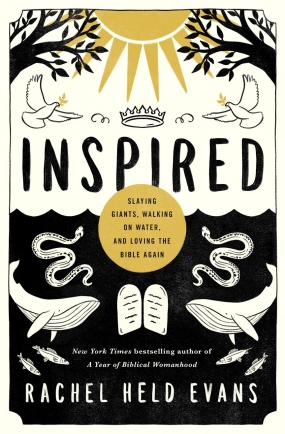


by Rick C. Mason

Regardless of our religious beliefs (or lack thereof) we all have a relationship with the Christian Bible. Its content and characters are woven through Western society, affecting our laws, mores, language, and even our understanding of the past and future.
Nowhere is this relationship more complicated than within the Christian community itself. How we view and understand these ancient writings is an ongoing debate, and the subject of Rachel Held Evans' new book "Inspired: Slaying Giants, Walking on Water, and Loving the Bible Again."
Evans had been raised in the tradition that the Bible is the inerrant word of God, and that its literal truths are valid and binding no matter when or where you live. Her faith was shaken as she wrestled with the inconsistencies she found in the readings, as well as how often they were selectively applied. She especially chafed at the suggestion that she, solely because she was female, should not question the scriptural interpretations of her male church leaders.
In her own words: "It was as if the Bible had turned into an unsettling version of one of those children's peekaboo books. Beneath the colorful illustration of Noah's ark was — surprise! — the violent destruction of humanity. Turn the page to Joshua and the battle of Jericho and — peekaboo! — it’s genocide. Open to Queen Esther's castle and — look! — there’s a harem full of concubines. Gone was the comforting storybook of my childhood, the useful handbook of my adolescence, and the definitive answer book of my college years. The Bible of my twenties served only as a stumbling block, a massive obstacle between me and the God I thought I knew."
She persevered, seeking a more definitive understanding. She learned of the societies behind the various books of the Bible, and how they shaped the oral traditions passed from generation to generation. She recognized that Paul's letters, instructions written to specific churches that he nurtured, were often crafted to respond to the particular challenges each was facing, and that women not only preached, but were active leaders in some of those early church communities.
But something was still missing: the love and joy which captivated her as a child. She realized that, above all, the Bible was a collection of stories. From Jacob, to Job, from the Israelites to the early Greek Christians, from Hagar to the unnamed woman who touched Jesus' cloak, these stories detailed God's relationship with people and societies, and just as important, their relationship with him. Those who challenged God, questioning his methods and decisions as well as their role in life, were the focus of many stories, and oftentimes affected change. Their stories were of struggle and recognition, of adversity and triumph.
She also learned that the Jewish tradition, the core of so much within the Biblical tradition, is to question, debate, even argue about what the stories mean to us, the readers. This includes mental and spiritual wrestling with one's self, with others, and ultimately with God.
Evans' writing in "Inspired" highlights those aspects of the Bible which challenge many readers, inviting the reader to see them in the context of the ongoing relationship. Each section examines the stories from a range of viewpoints: religious, historical, social, psychological, and personal. She argues that recognizing these themes, woven into a tapestry of Judeo-Christian experience, offer a window to understanding our own experience.
These themes range from Origin stories, Deliverance, War, Wisdom, Resistance, Gospel ("good news"), Fish stories (metaphor and miracles), and Church. None of these themes are easily summarized or explained, simply because the Bible isn't intended to be an easily explained summary, but rather stories, poems, and letters that provide us with the starting point for an in-depth adult religious life. War stories celebrate against-the-odds underdog victories alongside attacks that we now view as genocide. Gospel stories tell of the life and ministry of Jesus, but also make it clear that he was experienced differently by nearly everyone he encountered. Church stories examine the contradictions and challenges within Paul's letters and throughout the wider church.
Interspersed between thematic chapters are Evans' personal exploration of a few stories. Here we will encounter a first person narrative of the pregnant Hagar as she flees the wrath of Sarah. We also encounter a play set in a cafeteria, cast with the characters of Job and his friends, discussing why bad things happen to people. We get to sit with the congregants in Nympha's house in Laodicea as she reads the latest letter from Paul. We even get a Choose-Your-Own-Adventure story about walking on water, and how the different choices we make can still lead to truth — as well as new questions. Deeper understanding is often drawn from previously unnoticed perspectives.
Like her previous book, "Searching for Sunday," Evans' prose is personal and friendly, and her enthusiasm contagious. Though the themes and background scholarship she discusses are complex, her explanations present them in a conversational manner that unveil the storytelling that lies at the heart of the Bible. And this, she states, is the key: "We may wish for answers, but God rarely gives us answers. Instead, God gathers us up into soft, familiar arms and says, 'Let me tell you a story.'"